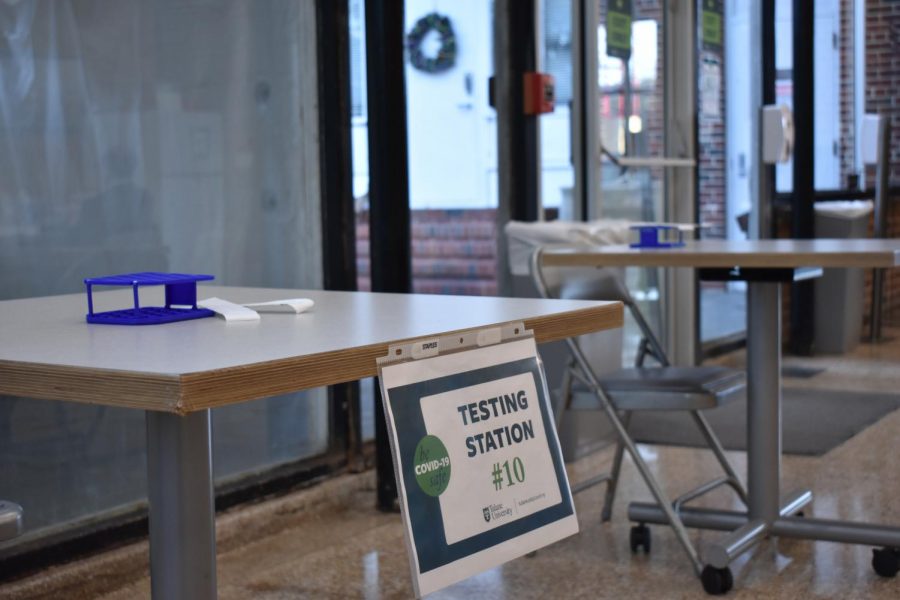Contact tracing failing as omicron spreads through Tulane
A Hullabaloo archive photograph of a COVID-19 testing station in Patterson Hall from February 2021.
As an outbreak of COVID-19 cases metastasizes through Tulane University — suspected by administrators and students to be the omicron variant — the university’s contact tracing system appears to be failing to contact known close contacts and even confirmed positive cases.
In multiple cases, Tulane’s contact tracing team has also not acted on self-reported positive COVID-19 results, even when those results were also conducted through Tulane’s testing program.
First-year Liza Flaherty tested positive for COVID-19 on Dec. 6. She was symptomatic and suspected that she had the flu — until she received an email the next day informing her it was COVID-19.
Flaherty says she waited for Tulane to reach out to her for “hours.” According to Flaherty, she contacted Campus Health directly and spoke with a contact tracer.
Flaherty said the individual she spoke with claimed that the contact tracing team had been attempting to reach her repeatedly.
That, Flaherty said, “was not true.” She received no calls or messages from them, apart from the initial positive result disclosure.
She said that she was told Campus Health had been “very overwhelmed with cases that day.” Tulane saw only 13 new cases on the day in question, Dec. 7. Since then, Tulane has seen at least 100 new cases.
Mike Strecker, assistant vice president for communications, stated that Tulane has 3 full-time contact tracers and “several” graduate students who work alongside them. In addition, Strecker said, “several campus health staff have been reassigned to supplement these contact tracers. They are working 7 days a week.”
Flaherty shared her close contacts with Tulane, as per Centers of Disease Control and Prevention guidelines. But only one contact — her roommate — received a contact tracing call.
According to Flaherty, that individual was told that because she had previously tested negative, she was not required to take a COVID-19 test.
Flaherty also said her other close contacts were not contacted by the university at all. Those individuals — classmates of hers — “had no idea that they had been exposed.”
Flaherty said that Tulane failed to share information about quarantine procedures or transportation until, again, she reached out to Campus Health. Flaherty was then directed to a case manager.
“Contact tracers attempt to speak with every student and always follow-up with an email. In addition, [Case Management and Victim Support Services] is notified to provide other assistance as needed,” Strecker stated.
According to Flaherty, the case manager said that because “there’s two Elizabeths” testing positive on her residence hall floor, he “was just confused with the first names.”
Clare McIntyre, who prefers to use her middle name, was the “other Elizabeth.” McIntyre said that her close contacts did not receive QR codes or emails from Tulane.
“They went out and got rapid tests from CVS,” McIntyre said. “They kind of had to figure that out for themselves.”
When asked about Tulane’s follow-up process for close contacts, Strecker said that “we focus on positive cases then move to the contacts.”
McIntyre’s positive result was not disclosed via an email from a contact tracer, but by phone call from a case manager.
She took a Tulane COVID-19 surveillance test on Tuesday, Dec. 7. Her results came back the next day, Dec. 8.
A faculty member in the School of Liberal Arts said that they had been able to disclose a potential COVID-19 exposure to one of their courses only because a student had shared their test results with the faculty member.
When asked if they thought Tulane was fully following up on close contact reports, the faculty member said that “there is no way for us, as faculty anyway, to know whether or not they are.”
A positive COVID-19 result falls under student privacy regulation and is considered personal health information. With that in mind, the faculty member observed, the lifting of the mask mandate makes the definition of a close contact in a classroom setting more opaque.
Another freshman, Sofia Feinberg, said that Tulane did not contact her about her potential exposure to COVID-19 until she proactively submitted a COVID-19 concerns report.
Feinberg said that another individual known to her was contact traced. According to Feinberg, that person was told that despite being a close contact, Tulane did not ask her “to test because she put down that she was asymptomatic.”
Research models from the American Medical Association indicate that 59% of individuals who tested positive for COVID-19 were infected by an asymptomatic carrier.
A Housing and Residence Life resident director informed resident advisers that students who tested positive — even through Tulane’s own COVID-19 surveillance testing — were encouraged to report themselves to the university. The administrator said that the increased caseload of the last week had made it difficult for Tulane to respond proactively to positive results.
Feinberg suspects that the university scheduled PCR tests for her only because she indicated she was symptomatic on her reporting form.
Jamal Wright, a Sharp Hall resident, tested positive with a COVID-19 home testing kit. He reported the positive result to Tulane on Dec. 10, but says the university has yet to contact him.
Wright proactively approached the staff at the Phelps Hall testing center for a COVID-19 test, which returned a negative result.
“As is the case with any illness, employees and affiliates should go to their personal physician, healthcare provider or location of their choice for symptomatic testing. Students who are symptomatic should go to the Campus Health Center,” Strecker said.
But, Wright says, his symptoms — body ache, chills and a cough — make him suspect he has a positive result. Wright has yet to receive any communications about the initial positive result that he reported to the university.
Your donation will support the student journalists of Tulane University. Your contribution will allow us to purchase equipment and cover our annual website hosting costs.



